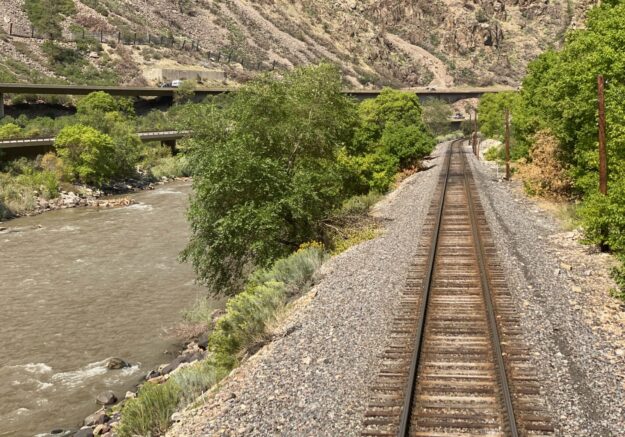Widgetized Section
Go to Admin » Appearance » Widgets » and move Gabfire Widget: Social into that MastheadOverlay zone
Eagle County commissioners raise serious concerns about Utah oil trains in letter to lawmakers

The Eagle County commissioners on Thursday fired off the following letter objecting to the Uinta Basin Railway oil-train project to Colorado U.S. Sens. Michael Bennet and John Hickenlooper, as well as U.S. Rep. Joe Neguse and Colorado Gov. Jared Polis:
February 9, 2023
The Honorable Michael Bennet United States Senate
261 Russell Senate Building Washington, DC 20510
The Honorable John Hickenlooper United States Senate
374 Russell Senate Building Washington, DC 20510
The Honorable Joe Neguse
United States House of Representatives 1419 Longworth House Office Building Washington, DC 20515
The Honorable Jared Polis Governor of Colorado State Capitol Building Denver, CO 80203
Dear Senator Bennet, Senator Hickenlooper, Representative Neguse and Governor Polis,
In 2021, the U.S. SurfaceTransportation Board (“STB”) approved a new 88-mile rail line connecting the Uinta Basin to the national rail network, where it will meet with the existing 457-mile Union Pacific Line to Denver. The sole purpose of the Uinta Basin Railway Project (Project”) is to dramatically increase oil production in the Uinta Basin, and to transport waxy crude oil to refineries largely in the southeastern U.S.
As proposed, the Project’s new rail traffic includes up to 9.5 trains a day, comprising eight locomotives and well over 100 cars, extending up to 10,000 feet in length, through hundreds of thousands of acres of federal land and traversing the Rocky Mountains. This of course includes Eagle County and many other local communities, at times within mere feet of the Colorado River, and into Denver and beyond. Though this decision garnered little attention at the time, Eagle County recognized the potential peril to both our own community and the shared resource of the Colorado River.
The STB did not evaluate the full environmental impacts of adding up to 8 miles of loaded oil trains a day on the existing Union Pacific Line running through Colorado, an action which is projected to double the rate of accidents along the route. Recognizing that a dramatic increase in rail traffic represents a commensurate increase in risk (of spark-induced wildfire, vehicle conflicts, derailments, water contamination, toxic spills, etc.), Eagle County sued to challenge the decision, particularly in light of the Biden administration’s directive to consider climate change in agency decisions. As STB board chair Martin Oberman stated in his dissenting opinion, “the project’s environmental impacts outweigh its transportation merits.”
Many other impacted communities became aware of the issue and shared their own concerns through amicus briefs, letters to representatives and the STB, and opinions in newspapers and other media.
The recent disaster in East Palestine, Ohio has highlighted the great peril of rail incidents. That incident and resulting toxic spill is the fourth rail incident in less than two years involving hazardous materials, potential long-term health consequences, and toxic environmental impacts. None of those lines ran 200 miles along the banks of a drinking water supply for 40 million people.
Project proponents have recently announced that they are seeking funding of up to $2 billion towards construction costs through U.S. Department of Transportation tax-exempt private activity bonds (“PABs”). Authorizing the Project to issue such tax-exempt bonds would substantially reduce the Project’s financing costs, amounting to a federal subsidy of hundreds of millions of dollars (if not billions) over the Project’s life. Such benefits are generally reserved for projects considered to be a public good worthy of foregoing tax revenue and where the incentives associated with PABs are necessary to attract private investment that would otherwise not see the value of the Project. The Uinta Basin Railway project is not a public good but a private boon to the oil industry, and a project that will force significant costs — in terms of environmental risk and climate damage — onto Coloradans.
The Biden administration and its agencies that have influence over this Project have heard concerns voiced by a myriad of different communities, officials, organizations, and community members. The communities below would like to join in expressing our significant concerns with the Project and particularly in the use of PABs to fund the same. We are unified in our opposition and consider this to be an urgent issue of statewide concern.
We have appreciated the attention to and work on this issue to date from some of our elected leaders, and we hope the disaster in East Palestine helps to bring the risk of the Uinta Basin line into better focus. We respectfully request coordination of all your offices to provide robust advocacy at the federal level to emphasize the urgency and the dangers of the Uinta Basin line to the administration and its relevant agencies, and to oppose any use of PABs from the federal government.
Sincerely,
Kathy Chandler-Henry Chair
Matt Scherr Commissioner
Jeanne McQueeney Commissioner
Cc:
State Senator Dylan Roberts
State Senator Perry Will
State Representative Elizabeth Velasco
State Representative Meghan Lukens
Boulder County Board of County Commissioners
Chaffee County Board of County Commissioners
Gilpin County Board of County Commissioners
Grand County Board of County Commissioners
Jefferson County Board of County Commissioners
Lake County Board of County Commissioners
City of Glenwood Springs
Town of Avon
Town of Basalt
Town of Eagle
Town of Gypsum
Town of Minturn
Town of Red Cliff
Colorado River Water Conservation District Board of Directors


